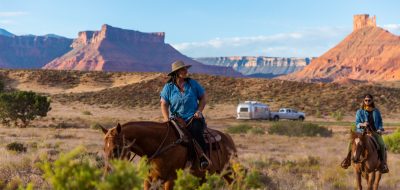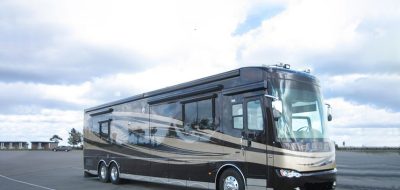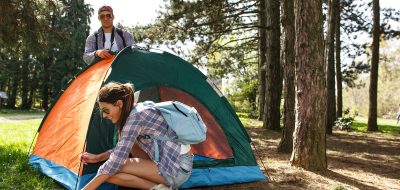A while back I was doing some research on RV insurance claims when I discovered what one insurance company listed as the top five RV insurance claims filed by RVers. I thought it would be worthwhile to discuss what these claims are and how you can avoid them.
Claim #1
This insurance company stated that it receives at least 400 claims each year involving fires around the back of the refrigerator that are caused by leaking propane lines. I’m not quite sure what would cause the gas lines to leak unless they were tampered with, but If you’re using your refrigerator in the LP gas mode, with an open flame, you definitely don’t want a leaking LP gas line.
How to avoid it
To avoid becoming a statistic I recommend that you take your RV to an authorized RV repair facility annually and have the entire LP gas system checked. RV technicians have the proper equipment to check the system for leaks and to make sure the LP gas pressure is adjusted properly.
You, the owner, can periodically inspect for LP gas leaks. To do this turn the main gas supply on, but do not light any pilot lights or other burners. Take a bottle of approved LP leak detector solution and dab around all gas fittings. If there is a leak the small bubbles will grow into larger bubbles. Tighten the fitting, and repeat the leak test. If the problem persists turn the LP gas supply off and take it to an RV repair center to have it checked out and repaired.
Claim #2
The next claim the insurance company listed was RV’s hitting gas station overhangs and bridges. RVers forget or don’t know the height of their RV and enter areas that don’t have enough overhead clearance.
How to avoid it
The first step is to measure the height of the RV from the ground to the highest point, usually the top off the air conditioner. Manufacturer brochures often times include this information. Check the footnotes to make sure it includes optional equipment like the air conditioner. For safety measure add an additional six inches to the overall height. Write this information down and post it in the RV or tow vehicle where it can be easily seen and will serve as a constant reminder for you. When you exit the interstate to refuel select an exit that has several fuel stations so you can pick one that is easy to navigate, and has plenty of overhead clearance. If you travel on roads less traveled be sure and check clearances on all overhead bridges before attempting to go under them.
Claim #3
The insurance company lumped retracting the RV steps and awnings together in this claim. Traveling with the awning properly secured is one concern and stowing your awning in bad weather is another concern. Since the claim was not very specific about the awning I will address both issues.
How to avoid it
When I worked for an RV dealership I saw the end result of not retracting the steps on more than one occasion. It’s easy to forget the RV steps when you are getting ready go on a trip or leave a campground. I can offer two ways to avoid this from happening to you. First you should always use a pre-trip checklist anytime you plan to move the RV. Second you should always walk around the entire RV a second time just before pulling out. You’ll be amazed at some of the things you missed the first time you walked around the RV.
The first thing we’ll cover concerning the awning is stowing it properly for travel. Make sure the awning is properly stowed against the side of the RV and the roller tube lock mechanism is in the retract position. Make sure the awning arm travel locks are latched and tighten the knobs on the back of the awning arms. The awning makes your RV six inches wider and you must always keep this in mind when you are traveling. I have seen many cases where the awning roller tube and fabric gets damaged by hitting or rubbing on something and the awning arms get damaged by catching on something. When navigating in close quarters, such as at a campground, use a ground guide to make sure you have enough clearance to avoid damage to the awning.
I’m not sure if the insurance company gets more claims for travel related damage to the awning or storm related damage. I think I have seen more awning damage caused by rain, wind and storms. You should always lower one end of the awning to allow for water run off. The weight from water pooling on the awning fabric can cause extensive and costly damage. Any wind over 20 miles per hour can also cause extensive damage to the awning and to the RV. Never leave the awning out unattended. If everyone is leaving the campsite, store the awning in the travel position. When you go to bed, store the awning in the travel position. Even when you are at the campsite, you should use awning tie downs to prevent any sudden damage caused by a high wind gust or a storm that moves in quickly.
Claim #4
The next claim the insurance company listed was for damage caused by tire blowouts. I have seen extensive damage to RVs caused by tire blowouts. Tire blowouts on RVs are caused by overloaded tires, under inflated tires, old tires and tires damaged by the ozone and UV rays.
How to avoid it
Just like the axles on your RV, tires have load ratings too. The maximum ratings are molded into the side of the tires. You need to have your fully loaded RV weighed to ensure that the tires are not overloaded. The only way to know if a tire is overloaded is to find scales where you can weigh individual wheel positions in addition to the overall weight, and the axle weights.
Another leading cause of tire failure is under inflated tires. The load rating for a tire is only accurate if the tire is properly inflated. Under inflated tires cause extreme heat build up that leads to tire failure. The appearance of the tire can look normal but the internal damage is not visible and the tire can fail at any time without warning.
Ideally you should check tire inflation, and adjust it if required, everyday that you move or drive your RV. If you can’t get into the habit of doing it on a daily basis you need to make it a point to check all tires weekly, at a minimum when you’re traveling. You always want to check the tires when they are cold, meaning that you don’t drive or move the RV before checking inflation pressure.
Ozone in the air and UV rays from the sun shorten the life of your tires. It’s not uncommon to see RV tires with low mileage and plenty of tread that are ruined by the damaging effects of ozone and UV rays. Ozone in the air causes tires to dry rot and deteriorate. UV rays from the sun make it happen quicker. This is especially true of the tires sidewall. Inspect your tires for checking or cracks in the sidewalls. If you notice any damage the tires should be inspected by a professional. To protect your tires from sun damage keep them covered with covers that will block out the sunlight when not in use.
Claim #5
Number five in the top five RV claims was for damage caused by rodent infestation. When RVs are stored for the winter it’s not uncommon for mice and squirrels to make their winter home in the RV. These animals are notorious for chewing through vehicle wiring and plastic and rubber lines, debilitating the entire vehicle.
How to avoid it
For some ideas on how to avoid rodent infestation in your RV check out my Pesky RV Citters article.
I was surprised that damage to TV antennas did not make it in the top five RV claims. It may be that it is cheaper to repair a damaged TV antenna than it is to file a claim and pay the deductible. I have seen many TV antennas and RV roofs damaged by forgetting to lower the TV antenna. The damage isn’t just from the antenna hitting something when it’s in the raised position; it’s also because the antenna cannot withstand the force from highway speeds when it’s in the raised position. There are a couple of ways to avoid damage to your TV antenna. One is to stick to the trusty pre-trip checklist before you move the RV. Another way is hang the motor home or tow vehicle starting key, or something like a piece of colorful ribbon on the TV antenna handle whenever it’s in the raised position. This will serve as a reminder to lower the antenna before you move the RV.
Armed with this advice, hopefully you can avoid becoming a statistic in the top five RV insurance claims. Be safe and have a great time exploring this wonderful country in your RV.
Happy Camping
Mark J. Polk






Wes Macnamara
For Rodent control: Try using urinal blocks preferrably new blocks, purchased from the local janitorial supply.
Rich D.
I wonder how many of those refrigerator fires were caused by the refrigerator and not by a leaking propane line. Everyone should check to be sure their refrigerator is not affected by one of the many recalls.
Mark Polk
Jorge,
It’s true that RV’s are not the best place to be during bad storms. I wrote an article on RV Emergency Weather Planning that explains how to prepare for, and what to do in the event of bad weather while RVing.
You can go here to read it http://www.rvuniversity.com/staticpages/index.php/WP101
Have fun full-timing!
mr_whit
Hi Mark, Might I suggest keeping a spray bottle mixed with water and liquid soap with you. By spraying the gas line or flex tubing, if it is leaking a small bubble will appear. If you see one, TURN OFF THE PROPANE!!!! and get it fixed.
Jerry Shea
Haning your keys on the TV up/down antenna handle is a great idea. I still can’t believe it, but I did drive away with the antenna up. I did a walk around, but when I looked up I was to close to the coach. Thanks goes to a trucker that slowed me down and pointed up about a 1/2 mile from the first underpass – wow. Now I not only walk around, but walk away and look back.
evie sanchez
My wife and I head out in our 1984 Jubilee full-time June 1st. Well, we so depend on your web site to learn things that we need to know about living in an RV. Well the insurance claim really helped and all has been noted. But this brings up a good question that weighs heavy on my mind. Thunder storms. Are we safe in our RV’s from them. What tips can you give us. The wife is AFRAID of them big time and now being in an RV will cause some friction (ha ha).
Jorge and very excited about leaving Miami!!